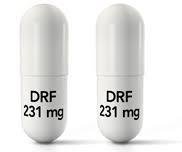Diroximel fumarate and Alcohol/Food Interactions
There are 2 alcohol/food/lifestyle interactions with diroximel fumarate.
Alcohol (Ethanol) Diroximel Fumarate
Moderate Drug Interaction
Ethanol may reduce the blood levels of the active medication in diroximel fumarate. You should avoid or limit the use of ethanol (alcohol) while being treated with diroximel fumarate. Talk to your doctor if you have any questions or concerns. It is important to tell your doctor about all other medications you use, including vitamins and herbs. Do not stop using any medications without first talking to your doctor.
Diroximel Fumarate Food/Lifestyle
Moderate Food Interaction
Taking diroximel fumarate with high-fat, high-calorie meals or snacks may reduce the levels of active medication in the blood, which may make the medication less effective in treating your condition. Food may help improve the tolerability of diroximel fumarate if you are experiencing flushing or gastrointestinal side effects from the medication; however, meals or snacks should contain no more than 700 calories and no more than 30 grams of fat. In addition, you should avoid or limit the use of alcohol while being treated with diroximel fumarate. Talk to your doctor or pharmacist if you have questions on how to take this or other medications you are prescribed. It is important to tell your doctor about all other medications you use, including vitamins and herbs. Do not stop using any medications without first talking to your doctor.
Switch to professional interaction data
Diroximel fumarate drug interactions
There are 646 drug interactions with diroximel fumarate.
Diroximel fumarate disease interactions
There are 5 disease interactions with diroximel fumarate which include:
More about diroximel fumarate
- diroximel fumarate consumer information
- Check interactions
- Compare alternatives
- Reviews (8)
- Side effects
- Dosage information
- During pregnancy
- Drug class: selective immunosuppressants
- Breastfeeding
- En español
Related treatment guides
Drug Interaction Classification
| Highly clinically significant. Avoid combinations; the risk of the interaction outweighs the benefit. | |
| Moderately clinically significant. Usually avoid combinations; use it only under special circumstances. | |
| Minimally clinically significant. Minimize risk; assess risk and consider an alternative drug, take steps to circumvent the interaction risk and/or institute a monitoring plan. | |
| No interaction information available. |
See also:
Further information
Always consult your healthcare provider to ensure the information displayed on this page applies to your personal circumstances.


